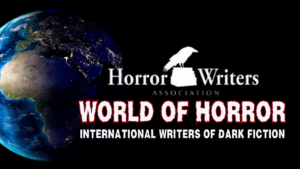
Somto Ihezue is a Nigerian-Igbo editor, writer and filmmaker. He was awarded the 2021 African Youth Network Movement Fiction Prize. A British Science Fiction Award, Nommo Award and 2022 Afritondo Prize nominee, his works have appeared in Tor: Africa Risen Anthology, Fireside Magazine, Podcastle, Escape Pod, Strange Horizons, Nightmare Magazine, POETRY Magazine, Cossmass Infinities, Flash Fiction Online, Flame Tree Press, OnSpec, Africa In Dialogue, and others. Somto is Original Fiction Manager at Escape Artists. He is an acquiring editor with Android Press and an associate editor with Cast of Wonders. He is an alumnus of the Milford SF Writers ’22, and Voodoonauts ’22, and will be attending Clarion West ’24. He is a member of SFWA, ASFS, BSFA, BFS and Codex.

What was it about the horror genre that drew you to it?
Familiarity. As an Igbo speculative fiction writer raised in a community steeped in culture and belief, and privy to oral stories fueled by the supernatural, the mythical and the horrific, my storytelling instantly mirrored these concepts.
Is there a horror tradition in your country, in your culture? A taste for horror, a market? Not necessarily literature; perhaps oral tradition too.
Yes, there is. From the films, the stories, the customs, the folklore—it’s all rich and steeped in horror. In particular, is the Mmanwu: a traditional masquerade ceremony of the Igbos. They are performed in exclusive secret societies and involve the use of elaborate, colorful costumes that are meant to invoke ancestral spirits.
Who are some of your favorite characters in horror, internationally and/or in your own culture?
Madam Koi Koi. She is a ghost in Nigerian and African urban legend who haunts dormitories, hallways and toilets in boarding schools at night, while in day schools she haunts toilets and students who come to school too early or leave school late. She is often depicted wearing a pair of red heels or wearing a single heel. She is one of the most popular boarding school ghosts in Nigeria, Ghana and South Africa.
Do you make a conscious effort to include characters and settings from your country in your writing and if so, what do you want to portray?
Originality. The conscious imbibement of my heritage into my craft gives it originality while giving my culture/way of life permanence and representation on a global scene.
If you are not a native English speaker, but write in English, do you first think of horror in your native language or English? How do you draft them in your mind, in English or your mother tongue?
English. Colonialism made sure of that. In school, I had to learn and think in English. It was a requirement. It was a conscious effort to erase native languages, banning them as a conversational tool in most schools. Schools believed it was hindering the assimilation of English by students. But in the words of Chinua Achebe, “Let no one be fooled by the fact that we may write in English, for we intend to do unheard of things with it.”
What has writing horror taught you about the world and yourself?
The horrors of the world are unending, but so am I.
How have you seen the horror genre change over the years? And how do you think it will continue to evolve, both in the US and in your country?
I believe horror is growing more diverse and inclusive. More people are telling stories, which is leading to the rise of independent horror, more and more. I think as that happens, there’s the appetite for more diverse stories and proof it CAN succeed.
How do you feel the International horror writing community has been represented thus far in the market and what hopes do you have for representation going forward?
I don’t think the international community has been repped as well as it should! So many great writers all over the world out of North America, and we should see more of them.
Who are some international horror authors you would recommend?
Nuzo Onoh
Dare Segun Falowo
Tlotlo Tsamaase
Ai Jiang
Suzan Palumbo
What is one piece of advice you would give horror authors today?
Be unabashedly terrifying.
And to the writers from your country out there who are just getting started, what advice would you give them?
Write. Do it trembling if you must.


Hi, I loved how honest your words are! It is important to me because I live in Spain, which runs away from the fact that the African continent is its neighbor to the south. I’ve just finished reading Nuzo Onoh, who has taught me another way of looking at horror. Looking forward to reading you & watching your movies. Good luck!